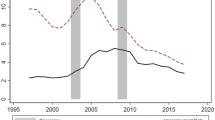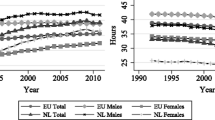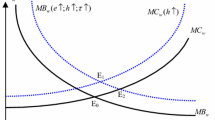Abstract
I investigate how contractual hours and overtime premiums affect the decision either to moonlight or to work overtime. By reducing the standard workweek, the government or labor unions can affect the likelihood that a worker faces an hour constraint. An underemployed worker can secure additional earnings by working either on a second job or overtime. I model this decision as a bivariate probit. To create variation in the overtime rates, data for nine OECD countries are pooled. I find that decreasing the standard hours of work increases the probability of moonlighting. The overtime premium has an ambiguous effect on the probability of moonlighting, but it has a negative effect on the probability of working overtime.
Similar content being viewed by others
References
Averett, Susan. “Moonlighting: Multiple Motives and Gender Differences.” Applied Economics 33 (September 2001): 1341–10.
Bauer, Thomas and Klaus F. Zimmermann. “Overtime Work and Overtime Compensation in Germany.” Scottish Journal of Political Economy 46 (September 1999): 419–36.
Bell, David N. F. and Robert A. Hart. “Overtime Working in an Unregulated Labour Market.” Bonn: IZA Discussion Paper Series No. 44 (June 1999).
Contensou, Francois and Radu Vranceanu. Working Time: Theory and Policy Implications. Northampton, MA: Edward Elgar, 2000.
European Commission. “Performances of the European Union Labour Market: Results of an Ad Hoc Labour Market Survey Covering Employers and Employees.” European Economy 3 (1995).
Eurostat. European Social Statistics—Labour Force 1999. Luxembourg: OPEC, 2000.
Friesen, Jane. “Overtime Pay Regulation and Weekly Hours of Work in Canada.” Labour Economics 8 (May 2002): 691–720.
Golden Lonnie and Helen Jorgenson. “Time after Time—Mandatory Overtime in U.S. Economy.” Washington DC: Economic Policy Institute, 2002, <http://www.epinet.org/briefingpapers/120/bpl20.pdf>.
Green, William H. Econometric Analysis. Upper Saddle River, NJ: Prentice Hall, 2003.
Hamermesh, Daniel S. and Stephen Trejo. “The Demand for Hours of Labor: Direct Evidence from California.” Review of Economics and Statistics 82 (February 2000): 38–47.
Hunt, Jennifer. “Has Work-Sharing Worked in Germany?” Quarterly Journal of Economics 114 (February 1999): 117–48.
Kimmel, Jean and Karen S. Conway. “Who Moonlights and Why? Evidence from the SIPP.” Industrial Relations 40 (January 2001): 89–120.
— and Lisa M. Powell. “Moonlighting Trends and Related Policy Issues in Canada and United States.” Canadian Public Policy 25 (June 1999): 207–31.
Krishnan, Pramila. “The Economics of Moonlighting: A Double Self-Selection Model.” Review of Economics and Statistics 72 (November 1990): 361–67.
OECD. Employment Outlook. Paris: OECD, 1998.
—. Classifying Educational Programmes: Manual for ISCED-97 Implementation in OECD Countries. Paris: OECD, 1999.
—. Economic Survey of France. Paris: OECD, 1999.
Paxson, Christina and Nachum Sicherman. “The Dynamics of Dual Job Holding and Job Mobility.” Journal of Labor Economics 14 (July 1996): 357–93.
Perlman Richard. “Observations on Overtime and Moonlighting.” Southern Economic Journal 33 (October 1966): 237–44.
U.S. Department of Labor, Wage and Hour Division. “Defining and Delimiting the Exemptions for Executive, Administrative, Professional, Outside Sales, and Computer Employees: Final Rule.” Federal Register 69 (April 2004): 22121–274.
Author information
Authors and Affiliations
Additional information
I thank R.L. Oaxaca, R. Stratton, and M. Nelson for their valuable comments and help. Any errors are solely my responsibility.
Rights and permissions
About this article
Cite this article
Renna, F. Moonlighting and overtime: A cross-country analysis. J Labor Res 27, 575–591 (2006). https://doi.org/10.1007/s12122-006-1021-0
Issue Date:
DOI: https://doi.org/10.1007/s12122-006-1021-0




